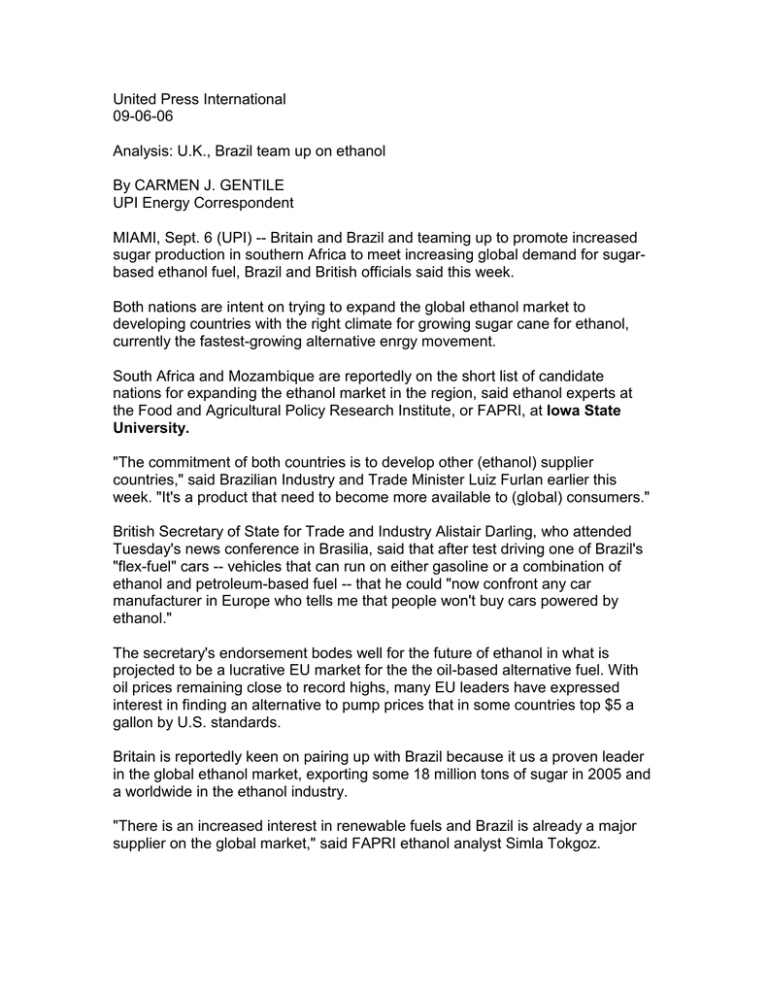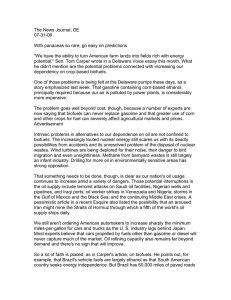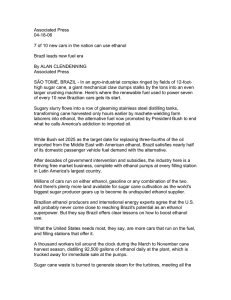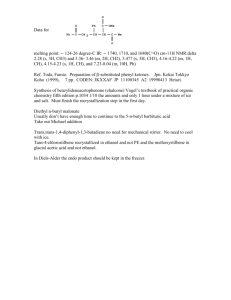United Press International 09-06-06 Analysis: U.K., Brazil team up on ethanol
advertisement

United Press International 09-06-06 Analysis: U.K., Brazil team up on ethanol By CARMEN J. GENTILE UPI Energy Correspondent MIAMI, Sept. 6 (UPI) -- Britain and Brazil and teaming up to promote increased sugar production in southern Africa to meet increasing global demand for sugarbased ethanol fuel, Brazil and British officials said this week. Both nations are intent on trying to expand the global ethanol market to developing countries with the right climate for growing sugar cane for ethanol, currently the fastest-growing alternative enrgy movement. South Africa and Mozambique are reportedly on the short list of candidate nations for expanding the ethanol market in the region, said ethanol experts at the Food and Agricultural Policy Research Institute, or FAPRI, at Iowa State University. "The commitment of both countries is to develop other (ethanol) supplier countries," said Brazilian Industry and Trade Minister Luiz Furlan earlier this week. "It's a product that need to become more available to (global) consumers." British Secretary of State for Trade and Industry Alistair Darling, who attended Tuesday's news conference in Brasilia, said that after test driving one of Brazil's "flex-fuel" cars -- vehicles that can run on either gasoline or a combination of ethanol and petroleum-based fuel -- that he could "now confront any car manufacturer in Europe who tells me that people won't buy cars powered by ethanol." The secretary's endorsement bodes well for the future of ethanol in what is projected to be a lucrative EU market for the the oil-based alternative fuel. With oil prices remaining close to record highs, many EU leaders have expressed interest in finding an alternative to pump prices that in some countries top $5 a gallon by U.S. standards. Britain is reportedly keen on pairing up with Brazil because it us a proven leader in the global ethanol market, exporting some 18 million tons of sugar in 2005 and a worldwide in the ethanol industry. "There is an increased interest in renewable fuels and Brazil is already a major supplier on the global market," said FAPRI ethanol analyst Simla Tokgoz. Both nations are also reportedly want to develop the infruscture needed to enhance sugar production in both perspective nations, noted fellow FAPRI ethanol specialist Amani Elobeid. "The viability is there,"said Elobeid, who added that Britain is a leader among EU nations investigating the fesibility of ethanol as a long-term solution to future fuel needs and recognizes Brazil as something of a pioneer in the field. "Britain wants to diversify its sources for ethanol and areusing Brazil's expertise to do it," she said. Brazil's prowess in the industry is well documented, as the South American country has been involved in the ethanol fuel trade since the 1970s. In 1975, Brazil's Pro-Ethanol Program subsidized sugar mills to produce extra product specifically for the production of the biofuel in the wake of the oil price spike experienced worldwide. But the program was slow going at first and relied on federal funding. Then, in the late 1980s, it suffered an almost terminal blow when world sugar prices peaked, souring many motorists and cane producers to ethanol. Now with oil prices skyrocketing amid unrest in the Middle East, Brazil is once again experiencing a boom in the ethanol trade and striving toward meeting the new demand. Earlier this year, Brazil's federal energy company Petrobras signed an agreement to carry out a feasibility study for a new $225 million pipeline to carry ethanol from the center-west state of Goia to the coastal state of Sao Paulo. In June, Brazil unveiled another biofuel breakthrough, this time developing a new type of diesel fuel that is mixed with various vegetable oils, an innovation that energy officials said will save the country millions on imported diesel in the coming years. Unlike other forms of bio-diesel, the new fuel, dubbed "H-Bio" is mixed by the fuel distributor and not at the refinery, adding to the proposed savings, which Pertrobras said could total as much as $145 million a year once the new mixture hits the market. --



